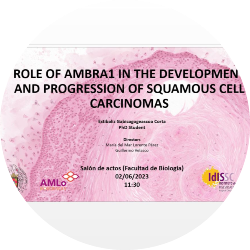07 June 2023
Virtual mode: https://madrid.zoom.us/j/82112222618https://madrid.zoom.us/j/82112222618?pwd=cUdQT0xveFlYVERCSXVtZkZFMU1PQT09
Classroom: Aula Fernández Cruz of the teaching pavilion of the Hospital Clínico San Carlos.
13:00 h
DOCTORAL THESIS: Advances in multiple sclerosis susceptibility factors.

Dña. Adela González Jiménez
Research Group on Genetics and Molecular Basis of Complex Diseases Health Research Institute of the Hospital Clínico San Carlos (IdISSC).
Multiple sclerosis (MS) is a chronic neuroinflammatory disease of the central nervous system and the most common cause of non-traumatic disability in young adults.
MS results from the interaction of environmental risk factors (obesity and adolescent mononucleosis, smoking, low serum vitamin D levels) in genetically susceptible individuals.
The genetic basis of MS is complex. Genome wide association studies (GWAS) have identified 233 genetic polymorphisms (single nucleotide polymorphisms or SNPs) associated with the risk of suffering from this disease in recent decades. This seminar will present the group’s studies analysing the influence of three of them, located in the vicinity of the NDFIP1, HHEX and MANBA genes, on the function of these genes by comparing the activity of T lymphocytes, B cells and NK cells in MS patients and healthy subjects.
Bibliography:
13:30 h
DOCTORAL THESIS: Role of the autophagy regulatory protein AMBRA1 in the generation and progression of squamous cell carcinoma.

Dña. Estibaliz Gabicagogeascoa Corta
Cannabinoid signalling in tumour cells research group. Health Research Institute of the Hospital Clínico San Carlos (IdISSC).
The autophagy-activating molecule BECLIN-1-regulated autophagy (AMBRA1) is involved in the regulation of different cellular processes, including autophagy and cell proliferation. Previous research has shown that AMBRA1 plays a tumour suppressor role. In this work we have studied the role of AMBRA1 in the origin of squamous cell carcinoma of the skin (cSCC) and in the progression of squamous cell carcinomas (SCC). The results obtained show that mice heterozygous for Ambra1 develop a higher number of papillomas after application of a chemical skin carcinogenesis protocol. Furthermore, AMBRA1 levels are found to be reduced in patient samples, suggesting a tumour suppressor role in the context of cSCC.
During this study we have also observed that AMBRA1 deficiency increases the proliferative and invasive capacity of SCC cells. Furthermore, we observed that SCC cells in which AMBRA1 has been genetically inactivated acquire a mesenchymal phenotype, thereby promoting the process of metastasis. Therefore, our data support the idea of the involvement of AMBRA1 in both the development and progression of SCC, with AMBRA1 being a possible prognostic biomarker of SCC.
Bibliography:
Connection link: https://madrid.zoom.us/j/82112222618
If you have any questions, please contact us by e-mail: